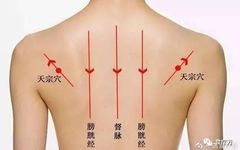1. Tian Zong (Heavenly Gathering) Point for Qi Regulation and Swelling Reduction
Meridian: Hand Taiyang Small Intestine Meridian.
Location: On the scapula, at the central depression of the infraspinatus fossa, level with the 4th thoracic vertebra. To locate: Let the arms hang naturally, the lower angle of the scapula is level with the 7th thoracic vertebra, count up 3 vertebrae to the 4th thoracic vertebra, and the intersection of the horizontal line from this point and the central point of the infraspinatus fossa is the location.
Cupping Effects: Unblock meridians and collaterals, regulate Qi and reduce swelling. Indications include scapular pain, breast abscess, etc.
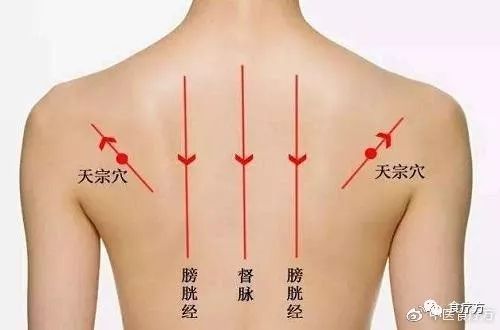
2. Gao Huang (Gao Huang) Point for Nourishing Deficiency
Meridian: Foot Taiyang Bladder Meridian.
Location: Level with the 4th thoracic vertebra spinous process, 3 inches lateral to the posterior midline.
Cupping Effects: Nourish deficiency, regulate lung Qi, indicated for cough, asthma, pulmonary tuberculosis, night sweats, hemoptysis, forgetfulness, nocturnal emissions, emaciation, and deficiency consumption.
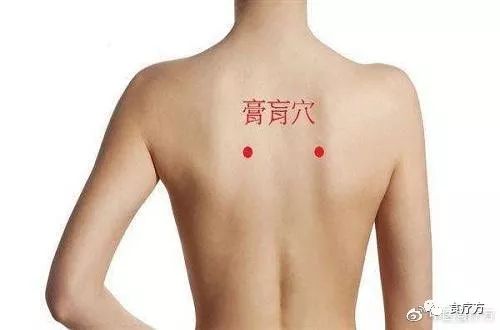
3. Zhi Yang (Ultimate Yang) Point for Strengthening the Spleen and Stomach
Meridian: Governing Vessel.
Location: On the back, at the depression below the spinous process of the 7th thoracic vertebra along the posterior midline. To locate: Lie prone, arms close to the sides of the body, at the level of the lower angle of the scapula, below the spinous process of the 7th thoracic vertebra.
Cupping Effects: Strengthen the spleen and stomach, clear damp-heat, indicated for jaundice, chest and rib distension, fever, cough, asthma, chest tightness, stomach pain, and back pain.
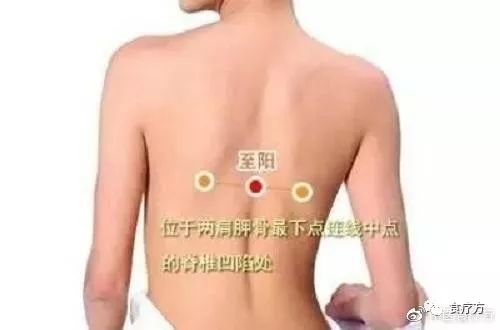
4. Da Zhu (Great Shuttle) Point for Clearing Heat and Dispelling Wind
Meridian: Foot Taiyang Bladder Meridian.
Location: On the back, below the spinous process of the 1st thoracic vertebra, 1.5 inches lateral to the posterior midline; to locate: the first thoracic vertebra is below the Dazhui point, and a vertical line from the midpoint of the inner edge of the scapula to the posterior midline intersects horizontally with the 1st thoracic vertebra.
Cupping Effects: Clear heat and dispel wind, strengthen tendons and bones, indicated for cough, fever, headache, and shoulder and back pain.
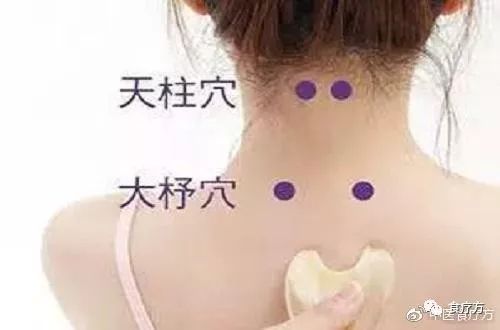
5. Feng Men (Wind Gate) Point for Tonifying Qi and Securing the Exterior
Meridian: Foot Taiyang Bladder Meridian.
Location: On the back, below the spinous process of the 2nd thoracic vertebra, 1.5 inches lateral to the posterior midline. To locate: the 2nd thoracic vertebra is two vertebrae down from Dazhui, and a vertical line from the midpoint of the inner edge of the scapula to the posterior midline intersects horizontally with the 2nd thoracic vertebra.
Cupping Effects: Tonify Qi and secure the exterior, dispel wind and release the exterior, clear heat from the chest. Indications include common cold, cough, fever, headache, neck stiffness, and chest and back pain.
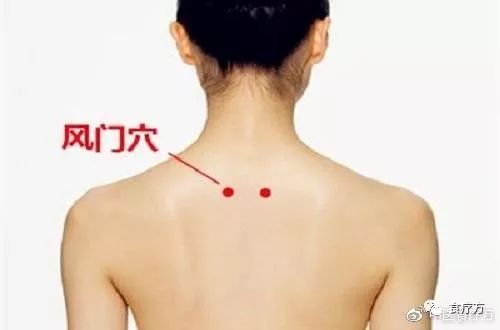
6. Fei Yu (Lung Shu) Point for Regulating Lung Qi
Meridian: Foot Taiyang Bladder Meridian.
Location: On the back, below the spinous process of the 3rd thoracic vertebra, 1.5 inches lateral to the posterior midline.
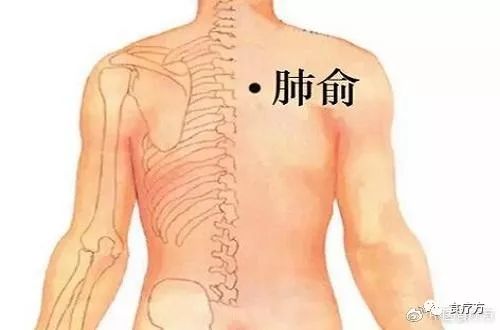
7. Ge Yu (Diaphragm Shu) Point for Regulating Qi and Descending Rebellious Qi
Meridian: Foot Taiyang Bladder Meridian.
Location: On the back, below the spinous process of the 7th thoracic vertebra, 1.5 inches lateral to the posterior midline. To locate: Let the arms hang naturally, the lower angle of the scapula is level with the 7th thoracic vertebra, and a vertical line from the midpoint of the inner edge of the scapula to the posterior midline intersects horizontally with the 7th thoracic vertebra.
Cupping Effects: Regulate Qi and descend rebellious Qi, invigorate blood and unblock meridians. Indications include epigastric pain, vomiting, hiccups, inability to eat, blood in stool, cough, asthma, hemoptysis, tidal fever, and night sweats.
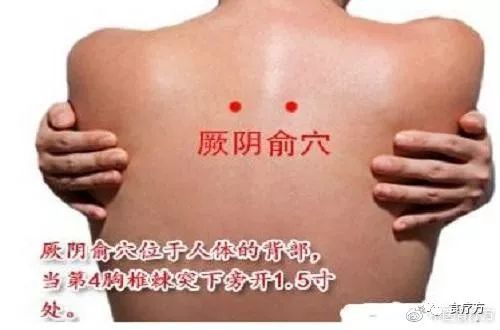
8. Xin Yu (Heart Shu) Point for Regulating Qi and Blood
Meridian: Foot Taiyang Bladder Meridian.
Location: On the back, below the spinous process of the 5th thoracic vertebra, 1.5 inches lateral to the posterior midline. To locate: from Dazhui, count down to the 5th vertebra, or find the inner edge of the scapula level with the 3rd thoracic vertebra and count down 2 vertebrae. A vertical line from the midpoint of the inner edge of the scapula to the posterior midline intersects horizontally with the 5th thoracic vertebra.
Cupping Effects: Regulate Qi and blood, unblock heart collaterals, calm the mind. Indications include heart pain, palpitations, irritability, insomnia, forgetfulness, nocturnal emissions, cough, hemoptysis, and night sweats.
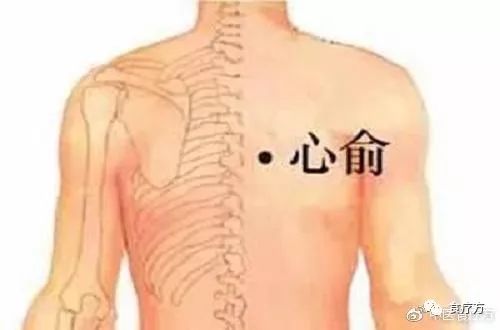
9. Ge Yu (Diaphragm Shu) Point for Regulating Qi and Descending Rebellious Qi
Meridian: Foot Taiyang Bladder Meridian.
Location: On the back, below the spinous process of the 7th thoracic vertebra, 1.5 inches lateral to the posterior midline. To locate: Let the arms hang naturally, the lower angle of the scapula is level with the 7th thoracic vertebra, and a vertical line from the midpoint of the inner edge of the scapula to the posterior midline intersects horizontally with the 7th thoracic vertebra.
Cupping Effects: Regulate Qi and descend rebellious Qi, invigorate blood and unblock meridians. Indications include epigastric pain, vomiting, hiccups, inability to eat, blood in stool, cough, asthma, hemoptysis, tidal fever, and night sweats.
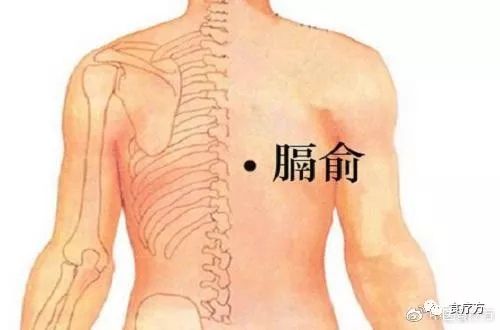
10. Gan Yu (Liver Shu) Point for Smoothing the Liver and Regulating Qi
Meridian: Foot Taiyang Bladder Meridian.
Location: On the back, below the spinous process of the 9th thoracic vertebra, 1.5 inches lateral to the posterior midline.
Cupping Effects: Soothe the liver and regulate Qi, benefit the gallbladder and relieve depression; indicated for jaundice, hypochondriac pain, back pain, red eyes, poor vision, night blindness, and hemoptysis.
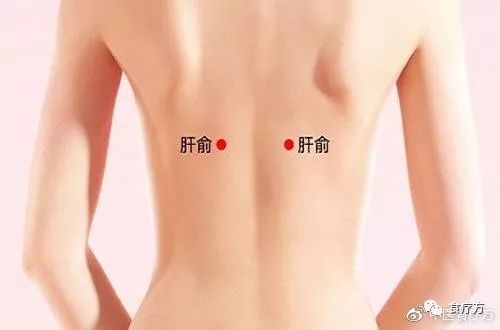
11. Dan Yu (Gallbladder Shu) Point for Smoothing the Liver and Benefiting the Gallbladder
Meridian: Foot Taiyang Bladder Meridian.
Location: On the back, below the spinous process of the 10th thoracic vertebra, 1.5 inches lateral to the posterior midline.
Cupping Effects: Soothe the liver and benefit the gallbladder; indicated for jaundice, hypochondriac pain, bitter taste in the mouth, vomiting, indigestion, pulmonary tuberculosis, and tidal fever.
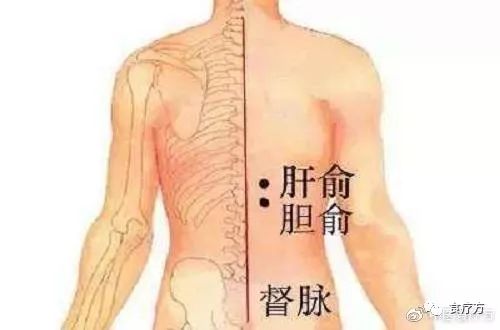
12. Pi Yu (Spleen Shu) Point for Strengthening the Spleen and Harmonizing the Stomach
Meridian: Foot Taiyang Bladder Meridian.
Cupping Location: On the back, below the spinous process of the 1st thoracic vertebra, 1.5 inches lateral to the posterior midline.
Effects: Strengthen the spleen, regulate blood, harmonize the stomach, and benefit Qi. Indications include abdominal distension, vomiting, diarrhea, dysentery, blood in stool, indigestion, edema, jaundice, and back pain.
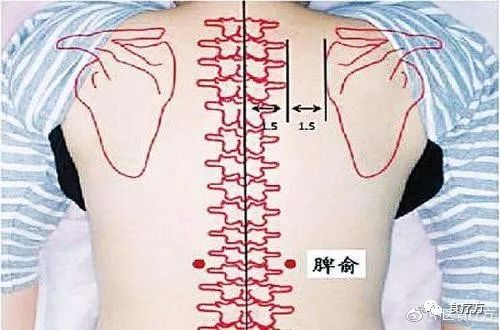
13. Wei Yu (Stomach Shu) Point for Strengthening the Spleen and Harmonizing the Stomach
Meridian: Foot Taiyang Bladder Meridian.
Location: On the back, below the spinous process of the 12th thoracic vertebra, 1.5 inches lateral to the posterior midline.
Cupping Effects: Strengthen the spleen and harmonize the stomach. Indications include stomach pain, abdominal distension, vomiting, borborygmus, and chest and rib pain.
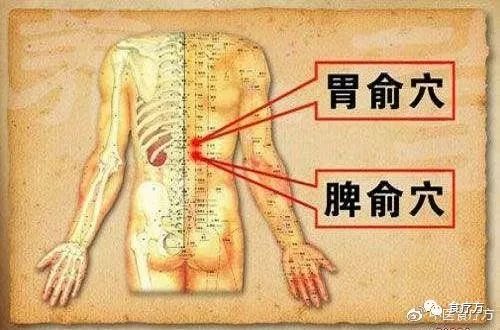
Note:
Special attention must be paid!! Acupoints in the neck should only be operated on under the guidance of a professional doctor!! There are many nerves and blood vessels in the neck, and touching them can cause irreversible harm!!
Cupping also has time limits; it should be done once a week. If you want to do it again, wait until the marks from the first session disappear. Each session should last 10 to 15 minutes. Avoid creating blisters, as they can easily become infected. Do not take a shower on the same day after cupping to prevent wind and cold from entering the body.

